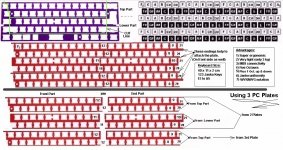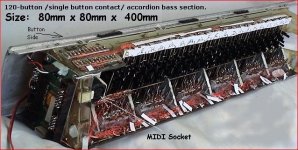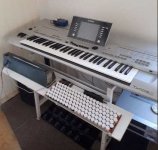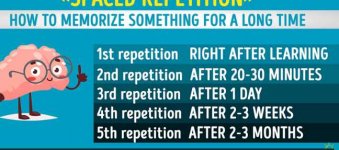jjj333
Member
Main request: I would like to know more about how memory mapping works. I can imagine that great accordionists/ pianists gained that much practice in it that their memory mapping is 100% precise from one note position to another, whereas my memory mapping still errs considerably. This process seems to advances very slowly and notation doesn't accelerate this process.
My novelty setup:
For a few years, I used to play the Paolo Soprani zebra accordion, but that monster weighed 12kg and I was too lazy to learn to play all scales on it and decided to only play C-major and A-minor on it. - It got a bit boring and all because I just hated to learn the accordion 24 times!
Now, at the age of 79 with more time on hand, I built myself a JANKO accordion keyboard. Often I unwittingly improvise melodies, which stretch over several scales and I don't even know in which I am. It's just like whistling or singing. Fantastic! - I also adapted an old 120-button Farfisa accordion bass to MIDI to fit the uniformity of the JANKO; otherwise, I would have to learn to finger major & minor chords. Now, all I have to do is to teach my fingers to locate the notes I'm after and getting better at it and that's where I may profit from your expert advice.
It's for this reason I find this setup to be the easiest to learn and play setup of them all. - Mind you, it wasn't easy to get my act together, because you can buy neither a MIDI accordion bass nor a JANKO Kbd on the cheap. Now that I know that ...there's no better, faster way to Rome, I just put all my efforts into mastering this JANKO layout. Now I would like to know more about how memory mapping works.
I suppose there's no point planning anything ahead, such as fingering, chords, etc. because I reckon once my memory is truly mapped to the JANKO layout ...everything falls into place by itself. I observed (thanks to progress by practice) that often my fingers found the correct key/note even before (!!) I searched for it, by just aurally following the melody! To me at least it proves how memory mapping acquisition works.
This is something I still don't know much about it and hope you experts are going to disclose it to me. A great accordionist advised me to keep practicing, but then again, Liberace said the same thing !! (...and I tell people. in regard to my whistling) - Like all apprenticeships, it's less enjoyable to overcome the many frustrations and hurdles, but I'm ready to take it on and hope that at age 100 I'll be 100% good at it... in time to serenade the heavenly angels.
Progress Report:
I'm taking on the most complex melodies, like tangos and some classical music in order to torture myself to succeed in that memory mapping procedure and don't care how many mistakes I make, for I noticed that the more I repeat the same melodies the mistakes gradually start to diminish. Therefore, there's no point to search for easier options, because that only prolongs the torture to success.
I reckon that's the only, though it's the most direct and painful way, yet it won't discourage me., because I feel fully committed. The only certainty I gained so far (by self-observation) is that if I keep going the way I go, my memory will gradually be forced (!!) to acquire the JANKO keyboard mapping. - I must never again fall victim to complacency. It's "Mein Kampf", which I have to win! Please be so kind to correct me...
Here's a sample of how my Midi accordion bass sounds: https://app.box.com/s/ydyz6o5x30pbe9604yi99mcgirvf0a9b
The great thing with this accordion bass part is that each of the 120 buttons has only one tiny contact and thus, is super-light to press. Yet, that was only possible by wiring up some 200 signal diodes and combining each button's notes manually.
My novelty setup:
For a few years, I used to play the Paolo Soprani zebra accordion, but that monster weighed 12kg and I was too lazy to learn to play all scales on it and decided to only play C-major and A-minor on it. - It got a bit boring and all because I just hated to learn the accordion 24 times!
Now, at the age of 79 with more time on hand, I built myself a JANKO accordion keyboard. Often I unwittingly improvise melodies, which stretch over several scales and I don't even know in which I am. It's just like whistling or singing. Fantastic! - I also adapted an old 120-button Farfisa accordion bass to MIDI to fit the uniformity of the JANKO; otherwise, I would have to learn to finger major & minor chords. Now, all I have to do is to teach my fingers to locate the notes I'm after and getting better at it and that's where I may profit from your expert advice.
It's for this reason I find this setup to be the easiest to learn and play setup of them all. - Mind you, it wasn't easy to get my act together, because you can buy neither a MIDI accordion bass nor a JANKO Kbd on the cheap. Now that I know that ...there's no better, faster way to Rome, I just put all my efforts into mastering this JANKO layout. Now I would like to know more about how memory mapping works.
I suppose there's no point planning anything ahead, such as fingering, chords, etc. because I reckon once my memory is truly mapped to the JANKO layout ...everything falls into place by itself. I observed (thanks to progress by practice) that often my fingers found the correct key/note even before (!!) I searched for it, by just aurally following the melody! To me at least it proves how memory mapping acquisition works.
This is something I still don't know much about it and hope you experts are going to disclose it to me. A great accordionist advised me to keep practicing, but then again, Liberace said the same thing !! (...and I tell people. in regard to my whistling) - Like all apprenticeships, it's less enjoyable to overcome the many frustrations and hurdles, but I'm ready to take it on and hope that at age 100 I'll be 100% good at it... in time to serenade the heavenly angels.
Progress Report:
I'm taking on the most complex melodies, like tangos and some classical music in order to torture myself to succeed in that memory mapping procedure and don't care how many mistakes I make, for I noticed that the more I repeat the same melodies the mistakes gradually start to diminish. Therefore, there's no point to search for easier options, because that only prolongs the torture to success.
I reckon that's the only, though it's the most direct and painful way, yet it won't discourage me., because I feel fully committed. The only certainty I gained so far (by self-observation) is that if I keep going the way I go, my memory will gradually be forced (!!) to acquire the JANKO keyboard mapping. - I must never again fall victim to complacency. It's "Mein Kampf", which I have to win! Please be so kind to correct me...
Here's a sample of how my Midi accordion bass sounds: https://app.box.com/s/ydyz6o5x30pbe9604yi99mcgirvf0a9b
The great thing with this accordion bass part is that each of the 120 buttons has only one tiny contact and thus, is super-light to press. Yet, that was only possible by wiring up some 200 signal diodes and combining each button's notes manually.
Attachments
Last edited:




